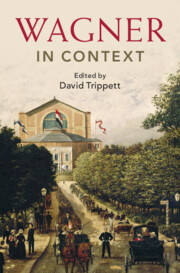Book contents
- Wagner in Context
- Composers in Context
- Wagner in Context
- Copyright page
- Contents
- Illustrations
- Musical Examples
- Contributors
- Acknowledgements
- Abbreviations
- Introduction
- I Place
- II People
- Chapter 9 Franz Liszt
- Chapter 10 Nietzsche and Wagner: The Logic of Contradiction
- Chapter 11 Wagner, Schopenhauer, and the World as a Phantasmagoria
- Chapter 12 Assessing Wilhelmine Schröder-Devrient: Influence, Genre, and Voice
- Chapter 13 Cosima Wagner
- Chapter 14 The Wagner Family: Rebellion, Honour, Aftermath
- III Politics, Ideas, and Bodies
- IV Life, Language, and the Ancient World
- V Music and Performance
- VI Reception
- Further Reading
- Select Bibliography
- Index
Chapter 14 - The Wagner Family: Rebellion, Honour, Aftermath
from II - People
Published online by Cambridge University Press: 14 March 2024
- Wagner in Context
- Composers in Context
- Wagner in Context
- Copyright page
- Contents
- Illustrations
- Musical Examples
- Contributors
- Acknowledgements
- Abbreviations
- Introduction
- I Place
- II People
- Chapter 9 Franz Liszt
- Chapter 10 Nietzsche and Wagner: The Logic of Contradiction
- Chapter 11 Wagner, Schopenhauer, and the World as a Phantasmagoria
- Chapter 12 Assessing Wilhelmine Schröder-Devrient: Influence, Genre, and Voice
- Chapter 13 Cosima Wagner
- Chapter 14 The Wagner Family: Rebellion, Honour, Aftermath
- III Politics, Ideas, and Bodies
- IV Life, Language, and the Ancient World
- V Music and Performance
- VI Reception
- Further Reading
- Select Bibliography
- Index
Summary
In contrast to a writer like Flaubert or a composer like Brahms, who scoffed at the idea of posterity even reading their letters, Wagner regarded his public persona as integral to his life’s work, not unlike Rousseau in the eighteenth century. But while family origins were a stable reference point for Rousseau, the idea of family for Wagner was more brittle. From his birth in Leipzig during unstable events leading to the 1813 Battle of Leipzig to the successful foundation of a family dynasty in Bayreuth in the 1870s, Wagner’s attitude to the nineteenth-century idea of family veered between open rebellion and full-scale adoption of its secrets and habits. I argue in outline for a better understanding of this ambivalence in Wagner’s thoughts and actions, including its consequences for his heirs and their fated relations with the Third Reich.
Keywords
- Type
- Chapter
- Information
- Wagner in Context , pp. 139 - 148Publisher: Cambridge University PressPrint publication year: 2024

